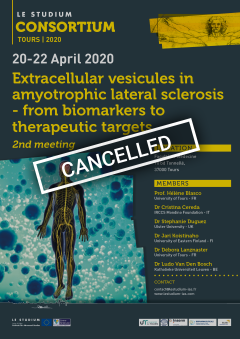Extracellular vesicules in amyotrophic lateral sclerosis - from biomarkers to therapeutic targets
2nd meeting
Faculté de Médecine
10 bd Tonnellé
37000 Tours
France
Presentation
** This event has been cancelled. Please contact Le Studium for more information. **
MEMBERS
- Prof. Hélène BlascoUniversity of Tours - FR
- Dr Cristina CeredaIRCCS Mondino Foundation - IT
- Dr Stephanie DuguezUlster University - UK
- Dr Jari KoistinahoUniversity of Eastern Finland - FI
- Dr Débora LanznasterUniversity of Tours - FR
- Dr Ludo Van Den BoschKatholieke Universiteit Leuven - BE
Description
Amyotrophic Lateral Sclerosis (ALS) is a neurodegenerative disease characterized by degeneration of motor neurons that leads to a progressive muscular paralysis. ALS patients usually die from respiratory insufficiency after 3 to 5 years of disease diagnosis. Nowadays, ALS research is focused on (1) the development of new therapeutic interventions that increase survival and slow disease progression; and (2) the identification of reliable biomarkers for this disease. Interestingly, brain-derived extracellular vesicles (EVs) can be found in plasma and used as a direct read-out of the status of the central nervous system. A recent study found EVs enriched by pathologic proteins in the plasma of ALS patients in comparison to control subjects. New evidence suggest that EVs rich in pathological proteins could act as scavengers, increasing the cellular clearance of these toxic proteins. However, they can also increase the propagation of pathological proteins to other cells, supporting the prion-like spread of ALS. Therefore, EVs secretion is an important feature for cell clearance and should be maintained, but targeting these EVs and inhibit their spread could represent a neuroprotective strategy against ALS progression.With this Consortium, we try to establish sustainable collaborations, each partner bringing its specific expertise that can be applied to the development of different projects and new therapeutics for ALS treatment. In an active approach to identify new therapeutic targets and to develop innovative treatments, the general strategy of the team is the search for molecular actors of pathogenesis in ALS by a global "omic" approach, to validate it on different cell types and use small molecules as tools for the development of therapeutic or as a starting point for therapy.








